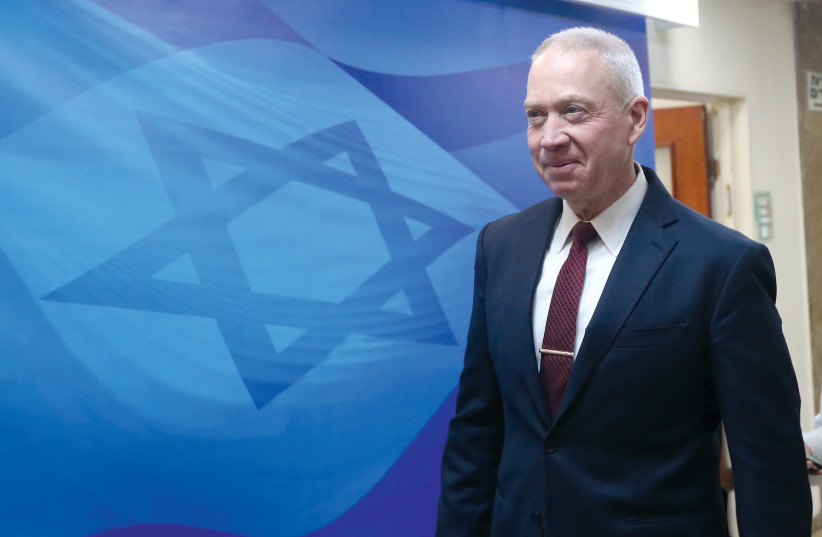Ministers and Knesset members (MKs) should not mention politics in their Remembrance Day speeches, Defense Minister Yoav Gallant wrote in a letter to Knesset Speaker MK Amir Ohana and government secretary Yossi Fuchs on Thursday.
Gallant's comments came after many bereaved families called in the past week on politicians not to attend ceremonies this year due to the commotion that their presence could create.
While politicians were symbols of the state and therefore their presence at the ceremonies were "very important," they should not mention politics and instead say "statesmanlike and Zionist" messages that "stress the revival of the state of Israel and focus on the values of unity and partnership," Gallant wrote, adding that politicians should "express honor and appreciation to the fallen" and "stand shoulder to shoulder alongside bereaved families, who paid the costliest price of all."
Prime Minister Benjamin Netanyahu addressed the issue as well, requesting in a video on Thursday afternoon that all public officials "put aside the argument and leave it outside of the cemetery," in order to enable the bereaved families to unite "silently" with the memory of their loved ones.
"The cemeteries' silent unity of grief shouts to us during these days."
Prime Minister Benjamin Netanyahu
"The cemeteries' silent unity of grief shouts to us during these days. Our cherished ones who fell, our cherished ones who paid with their lives for our revival did it for us – and we need to stand together for them. United in order to be worthy of their sacrifice," Netanyahu said.

"We all deserve to experience these days with all of the people of Israel standing unified behind our heroes, without any argument," he said.
Netanyahu himself is a bereaved family member. His older brother, Yoni, died on July 4, 1976 while leading Israeli elite Sayeret Matkal commandos during the famous Operation Entebbe to rescue 105 mostly Jewish and Israeli passengers whose flight was hijacked to Entebbe, Uganda.
Bereaved families especially opposed National Security Minister Itamar Ben-Gvir's scheduled appearance at the Beersheba military cemetery. A list of allocations of ministers to military ceremonies that the government put out on Thursday showed that this had not changed. In response, 23 bereaved families put a statement saying that the "draft evader, Kahanist, person who was convicted of supporting a terror organization and incitement to racism" should not attend.
MKs continue to discuss the new haredi drat law
In other news on Thursday, Gallant, Finance Minister Bezalel Smotrich, Ministerial Liaison to the Knesset David (Dudi) Amsalem and coalition whip and Likud faction leader MK Ofir Katz met for the third time this week in order to discuss a new haredi conscription law. The forum held the flurry of meetings after haredi party leaders clarified to Netanyahu last week that despite the sensitivity of the issue, they are insisting on the fulfillment of a coalition agreement clause to pass such a bill by the time Israel's budget passes on May 29.
According to a number of reports, the new bill will prioritize equality in the "economic burden" over the "military burden" by lowering the exemption age for haredi men, while minimizing the inequality to IDF soldiers by shortening the length of service and by providing higher benefits for those who do serve. The new exemption age is expected to be either 21,22 or 23, with the IDF preferring the latter. The size of benefits for those who serve is still unclear.
Protractors of the bill believe that a combination of three factors make this the preferred option: The last few decades showed that it is unrealistic to force haredi men to serve; that Israel's population growth means that the IDF has a manpower surplus; and that the largest weakness in Israel's economy is the approximately 50% unemployment of haredi men. Lowering the age in which haredi men may join the workforce will benefit the economy without hurting the army, they argue.
Detractors of the bill argued that de-facto allows an entire sector of Israeli society to skip the military, and is thus unequal and a violation of Israel's "people's army" model. It can also damage morale and lead other sectors to refuse to serve or demand exemptions. Finally, there is ample need for fire and rescue personnel, community volunteers and other civil institutions, and therefore an alternative solution is to continue the mandatory draft but broaden it to include national civil service, so that haredim can complete voluntary civil service within their own communities.
The Shas party's spiritual leadership, the Council of Torah Sages, is set to convene next week to discuss the issue, according to Maariv.
